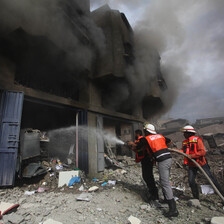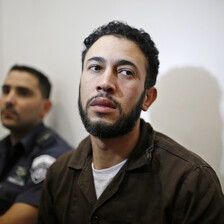The Electronic Intifada Gaza City 20 November 2012

Fieldworkers with Gaza human rights groups are documenting the impact of Israel’s bombing campaign day and night.
APA imagesPalestinian human rights organizations in the besieged coastal territory are struggling to document the rising casualties as Israel’s escalated attacks on the Gaza Strip continue into the seventh day.
“The bombardments and air raids are everywhere in the Gaza Strip,” Issam Younis said at the Gaza City office of the Al-Mezan Center for Human Rights on Monday afternoon.
Younis, the center’s director, oversees a staff normally scattered among offices across the Strip — in Gaza City, Jabaliya and Rafah — and whose duties include documentation, advocacy, media and public information work.
“The number of casualties is very high,” he said. “For us, it is very difficult and complicated to be everywhere we need to be.”
“As a center, our main task is to monitor the human rights situation, and to document the violations that are taking place.”
It is crucial, Younis says, to document violations quickly. “We have to be on the spot. This is sometimes dangerous. But our field workers are there, day and night.
“We have to follow the attacks, interview victims and eyewitnesses, and document everything. It’s our responsibility to reveal the crimes continually committed by the Israeli army.
“And we think the value of our work requires that it be done on time. Some evidence might be destroyed, for example when contents are removed from houses that have been destroyed.”
Coping
But even as increasing attacks test the center’s capacity, Younis says, the danger throughout the Gaza Strip keeps many of its field researchers from their normal work.
“Not all of them can come to the office,” he said. “Some have to stay at home with their families. For others, it is too dangerous to travel.
“Some of us are working from home. And all of us are doing what we can to cope with the situation.
“It’s important that we do this. We are preparing files for legal cases. And field documentation is a requirement is a requirement for our other work, whether advocacy or legal.”
Because of the challenges facing the center, many of its workers from other departments have shifted into field work. “Almost all of the staff are doing field work [to] cope with the unexpected number of violations that should be documented,” Younis says.
Only a skeleton crew of three to four staffers remain in the Gaza City office. Those in Rafah and Jabaliya are empty.
Repeatedly bombed
A few blocks away, Raji Sourani, director of the Palestinian Centre for Human Rights, looks exhausted. He told The Electronic Intifada that he hasn’t slept for days.
“Three hundred meters from my home, there is a civil affairs office owned by the Interior Ministry,” he said. “They do paperwork.”
The building, he said, is in a crowded population center. “Within 300 meters of it, you will find tens of thousands of people.”
But the Israeli air force has bombed it repeatedly.
“And each time, there have been not less than four, five, or six bombs,” he said.
“Why are they doing that?” he asked. “They use high-tech F-16s, and very expensive bombs, very big bombs, very sophisticated bombs.
“Is any logic there in this? I would say no. There is no logic from a security perspective.”
Israel’s strategy, Sourani thinks, is to instill fear in the Gaza Strip’s civilian population. Mentioning an empty football field targeted by Israeli warplanes, he asked rhetorically, “Why did they bomb it? Is it to destroy the field? Why did they use four bombs?
“They want to terrorize the people of Gaza! They are doing all these air raids. Are they stupid? This is money, time, risk to the lives of pilots and others, and bringing quite a lot of rage and hatred. Why are they doing this?
“I think they want to keep 1.6 million people in 365 square kilometers in fear and terror. I have no other explanation.”
“As usual, the situation is unpredictable,” Younis said. “We were not expecting this. But we have to cope.
“The worst thing here is the unpredictability,” he added. “We can’t plan for the long term. But we will adjust. We are used to this.”
Regular updates and data on the human rights situation Gaza can be found at www.mezan.org and pchrgaza.org.
Joe Catron is a US activist in Gaza, Palestine. He works with the Centre for Political and Development Studies (CPDS) and other Palestinian groups and international solidarity networks, particularly in support of the boycott, divestment and sanctions and prisoners’ movements. He blogs at joecatron.wordpress.com and tweets at @jncatron.





